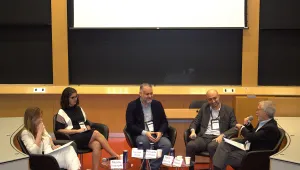An Economic Perspective
Last June, Pope Francis released his much-anticipated encyclical on the environment, Laudato Si’, which received tremendous praise from diverse quarters. The same day, Coral Davenport, writing in the New York Times, noted that the papal encyclical "is as much an indictment of the global economic order as it is an argument for the world to confront climate change." Ms. Davenport quoted me (accurately) as saying that elements of the encyclical were unfortunately "out of step with the thinking and the work of informed policy analysts around the world." In this column, I will elaborate.
First of all, the Pope is to be commended for taking global climate change seriously, and for drawing more world attention to the issue. There is much about the encyclical that is commendable, but where it drifts into matters of public policy, I fear that it is — unfortunately — not helpful.
The long encyclical ignores the causes of global climate change: it is an externality, an unintended negative consequence of otherwise meritorious activity by producers producing the goods and services people want, and consumers using those goods and services. That is why the problem exists in the first place. There may well be ethical dimensions of the problem, but it is much more than a simple consequence of some immoral actions by corrupt capitalists. The document also ignores the global commons nature of the problem, which is why international cooperation is necessary.
If the causes of the problem are not recognized, it is very difficult — or impossible — to come up with truly meaningful and feasible policy solutions.
So, yes, the problem is indeed caused by a failure of markets, as the Pope might say, or — in the language of economics — a "market failure." But that is precisely why sound economic analysis of the problem is important and can be very helpful. Such analysis points the way to working through the market for solutions, rather than condemning global capitalism per se.
In surprisingly specific and unambiguous language, the encyclical rejects outright "carbon credits" as part of a solution to the problem. It says they "could give rise to a new form of speculation and would not help to reduce the overall emission of polluting gases." The encyclical asserts that such an approach would help "support the super-consumption of certain countries and sectors."
That misleading and fundamentally misguided rhetoric is straight out of the playbook of the small set of socialist Latin American countries that are opposed to the world economic order, fearful of free markets, and have been utterly dismissive and uncooperative in the international climate negotiations.
Those countries have been strongly opposed to any market-based approaches to climate change, including carbon taxes, cap-and-trade, and offset systems, as well as any approaches that would allow — through appropriate linkage — the financing by one country of emissions reductions in another country (see my previous column, "A Key Element for the Climate Talks," November/ December 2015).
If the references to "carbon credits" were intended to refer only to offset systems (such as the Clean Development Mechanism) and not to cap-and-trade systems, then I would be much less concerned about the Pope's complaints. However, the encyclical does not make the distinction. Indeed, I doubt that the authors of the encyclical recognize the difference, and unfortunately, readers of the encyclical will likewise lump together all carbon markets, which is what some policymakers also do, unfortunately.
I respect what the Pope says about the need for action, but his unfortunate attack on the use of the market to address climate change is out of step with the thinking and the work of informed analysts and policymakers around the world, who recognize that we can do more, faster, and better with the use of market-based policy instruments — carbon taxes and cap-and-trade systems. UN Secretary General Ban Ki-moon has been outspoken in precisely this regard.
Furthermore, the United Nations Framework Convention on Climate Change itself, in Article 3.3, explicitly states that "policies and measures to deal with climate change should be cost-effective so as to ensure global benefits at the lowest possible cost" and thereby be more ambitious. That is why marketbased climate policy instruments are an important option for many countries. Keeping costs down will help inspire greater action.
Stavins, Robert N. “Are the Pope's Critiques of Markets on Point or Somewhat Misguided?.” The Environmental Forum, January/February 2016





